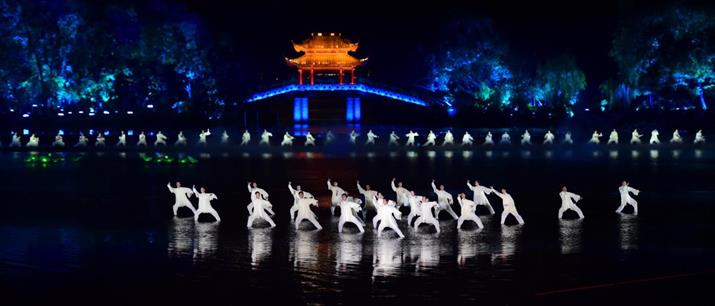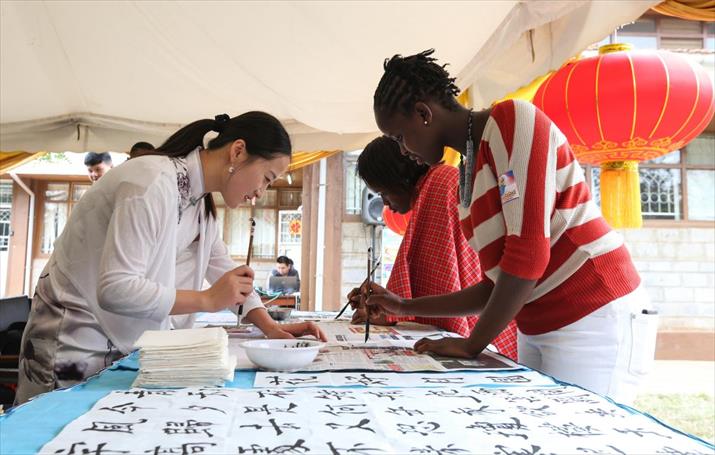| Opinion |
| A National Faith | |
| Confidence in Chinese culture is essential for the renewal of the nation | |
|
|
 A Taichi performance for participants of the G20 Summit in Hangzhou, east China's Zhejiang Province, on September 4, 2016 (XINHUA)
A country's soul The report contains Xi's insightful vision of cultural confidence. For example, when talking about the CPC's mission, he said the entire Party "must strengthen our confidence in the path, theory, system and culture of socialism with Chinese characteristics," adding that cultural confidence represents "a fundamental and profound force that sustains the development of a country and a nation." "Culture is the soul of a country and a nation," he said. "Our country will thrive only if our culture thrives, and our nation will be strong only if our culture is strong. Without full confidence in our culture, without a rich and prosperous culture, the Chinese nation will not be able to rejuvenate itself." So the need is to develop a socialist culture with Chinese characteristics, inspire the creativity of the nation, and develop a "great socialist culture" in China. It's not the first time the CPC has underlined the need for cultural confidence. The 18th CPC National Congress in 2012 called on the Party to be confident in the path, theory and system with Chinese characteristics. In the following five years of China's development, the importance of cultural confidence in the course of building socialism with Chinese characteristics and the renewal of the Chinese nation gradually emerged. In February 2014, at a study session of the Political Bureau of the CPC Central Committee, Xi observed that the Party should strengthen its cultural and ideological confidence. Ten months later, he accentuated it at a symposium with students from the University of Macau. Xi also stressed cultural confidence at a celebration of the 95th anniversary of the founding of the CPC on July 1, 2016, saying the whole Party should strengthen confidence in the path, theory, system and culture of socialism with Chinese characteristics.  Deng Qianqian, a Chinese language teacher, instructs her students to practice calligraphy at Confucius Institute in Kenyatta University, Kenya, on September 15, 2016 (XINHUA)
Culture vs. progress There had been a long-lasting debate about the relationship between Chinese culture and the country's development path in China since the early 20th century. Even in the 1980s, after China's reform and opening-up drive started, many people complained that traditional Chinese culture was backward and constituted a hurdle for the country's development. A feeling of cultural inferiority became deeply rooted in the nation. But Chinese people had full confidence in their culture before 1840, when other countries in Asia admired and absorbed Chinese culture. However, that confidence eroded bit by bit following a series of military defeats against Western invaders, the continuing decline of national strength and status on the international stage, as well as several failed attempts to revive the country after the Opium War of 1840. The Chinese nation was endangered. Neither the Qing Dynasty (1644-1911) government's Self-Strengthening Movement (1861-95) aimed at technological and military modernization nor the Hundred Days' Reform (1898) seeking to make social and institutional changes could save the falling empire. Even after the Qing Dynasty was overthrown and the Republic of China was established in 1912, China remained mired in domestic turmoil and foreign aggression. After a century of great efforts, it failed to rise to its feet and feed its people. Some Chinese intellectuals then attributed the country's suffering to its culture, saying China was bullied because of cultural backwardness. They believed political and social problems would be resolved and the nation rejuvenated only if Chinese culture was reoriented. The long confidence in national culture collapsed and an inferiority complex came into being. In the 1930s, some even advocated thorough westernization of Chinese culture. The inferiority complex had a profound implication for the mindsets of several generations of Chinese people. Restoring confidence Consequently, the need for national renewal is becoming more and more evident. To restore confidence in national culture has become a need for better cultural and ethical standards and for unleashing the country's growth potential. Looking back on Chinese history, we can see that restoring confidence in Chinese culture and taking it as China's national faith mean re-enlightening the Chinese mindset. With a history of more than 5,000 years, the glorious Chinese culture helps China position itself on its way toward modernization. It provides the fundamental faith guiding the Chinese to conquer obstacles and attain national renewal. In a world full of political and interest conflicts, China has contributed greatly to the stability of the international community by advocating the principles that "harmony is most precious" and "universal love and no attack." The country, following the principle "do unto others as you would have them do unto you," promotes seeking common ground and shelving differences when dealing with bilateral ties. Today, it has established partnerships with many countries and eliminated many conflicts, thereby helping create a peaceful international environment. All these concepts come from the splendid Chinese culture. Many other Chinese values, including harmony, moderation and inclusiveness, have unique strength to resolve international conflicts and improve the system of global governance. Also, the innovative Chinese domestic governance solutions—such as "one country, two systems" and the socialist market economy—have also originated from the pragmatic values in Chinese culture. There are countless other examples to show modern utilization of Chinese culture. The Chinese have good reason to be confident in their own culture. Cultural confidence will be a profound force to sustain the country's socialist modernization. The author is a professor at the School of International Relations and Diplomacy, Beijing Foreign Studies University Copyedited by Sudeshna Sarkar Comments to baishi@bjreview.com |
|
||||||||||||||||||||||||||||
|